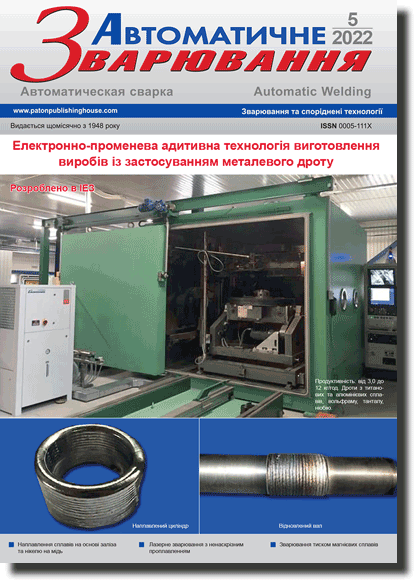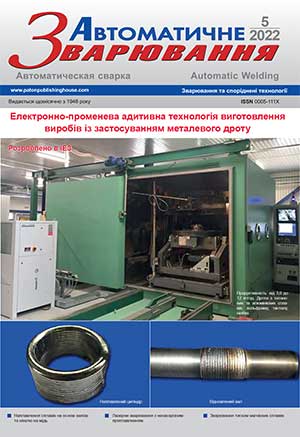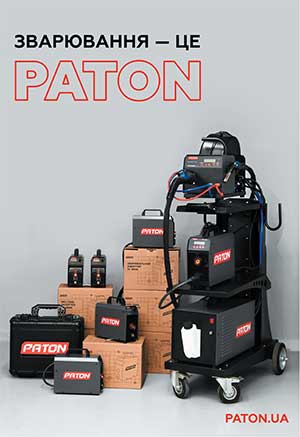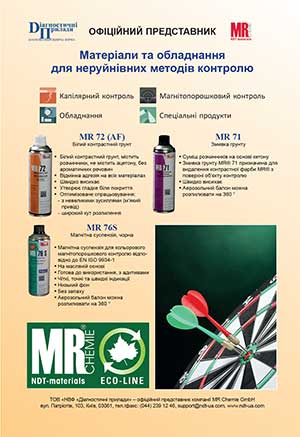| 2022 №05 (01) |
DOI of Article 10.37434/as2022.05.02 |
2022 №05 (03) |
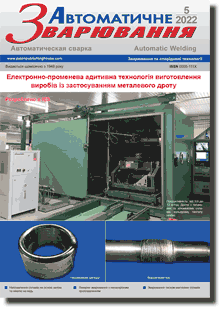
"Avtomatychne Zvaryuvannya" (Automatic Welding), #5, 2022, pp. 10-15
Electric arc surfacing of wear-resistant iron- and nickel-based alloys on copper
І.О. Ryabtsev1, A.A. Babinets1, I.P. Lentyugov1, I.L. Bogaychuk1, A.I. Panfilov2
1E.O. Paton Electric Welding Institute of the NAS of Ukraine. 11 Kazymyr Malevych Str., 03150, Kyiv, Ukraine. E-mail: office@paton.kiev.ua
2OJSC «Steel Work», 50 Myru Ave., 50000, Kryvyi Rih, Ukraine.
The results of studying the formation of welded joint in electric arc surfacing on copper by the wires, providing a deposited metal based on iron and nickel, which according to the authors and publications in the technical literature have a high resistance to different types of wear at elevated temperatures. The modes were selected and technologies of arc surfacing on a copper basis by selected wires were developed, which provide a satisfactory formation of the deposited metal and its fusion with the base metal. According to the results of experiments on electric arc surfacing on copper, as well as the study of macro- and microstructure of deposited specimens, it was shown that the best results in terms of welding and technological properties are provided by the use of nickel-based wire. The permissibility of individual defects that were found in the deposited metal and on the fusion line of the base and deposited metal during studies will be determined by the operating conditions of specific parts. 8 Ref., 1 Tabl., 8 Fig.
Keywords: surfacing on copper, wear-resistant alloys, electric arc surfacing, copper, weldability, fusion zone
Received: 19.04.2022
References
1. Gurevich, S.M. (1990) Spravochnik po svarke cvetnyh metallov [Non-ferrous metal welding guide]. Kiev, Naukova dumka, [in Russian].2. Lide, D.R., Haynes, W. (2018) CRC Handbook of chemistry and physics: a ready-reference book of chemical and physical data. Boca Raton, Taylor and Francis.
3. Babinets, A.A., Ryabtsev, I.O., Lentyugov, I.P. et al. (2020) Problems and prospects of surfacing of copper and copper parts by wear-resistant layers (Review). The Paton Welding J., 5, 15-23. https://doi.org/10.37434/tpwj2020.05.03
4. Rjabcev, I.A., Senchenkov, I.K., Turyk, Je.V. (2015) Naplavka. Materialy, tehnologii, matematicheskoe modelirovanie [Surfacing. Materials, technologies, mathematical modeling]. Gliwice, Wydawnictwo Politechniki Slaskiej, [in Russian]. https://doi.org/10.15407/tpwj2015.06.29
5. Pereplyotchikov, E.F. (2004) Plasma-powder cladding of wear- and corrosion-resistant alloys in valve manufacturing. The Paton Welding Journal, 10, 31-37.
6. Pereplyotchikov E.F. (2015) Plasma-powder surfacing of nickel and cobalt alloys on copper and its alloys. The Paton Welding Journal, 5-6, 10-13. https://doi.org/10.15407/tpwj2015.06.02
7. Silva, C.C., de Miranda, E.C., Motta, M.F. et al. (2012) Dilution control of weld overlay superalloys using Taguchi method. Proc. of the ASME 31st int. conf. on ocean, offshore and arctic engineering, 6, 289-299. https://doi.org/10.1115/OMAE2012-83971
8. Robert, W. Messler (2019) A Practical Guide to Welding Solutions: Overcoming Technical and Material‐Specific Issues. Wiley‐VCH Verlag GmbH & Co. KGaA. https://doi.org/10.1002/9783527818815
Advertising in this issue:
The cost of subscription/purchase order journals or individual articles
| Journal/Currency | Annual Set | 1 issue printed |
1 issue |
one article |
| TPWJ/USD | 384 $ | 32 $ | 26 $ | 13 $ |
| TPWJ/EUR | 348 € | 29 € | 24 € | 12 € |
| TPWJ/UAH | 7200 UAH | 600 UAH | 600 UAH | 280 UAH |
| AS/UAH | 1800 UAH | 300 UAH | 300 UAH | 150 UAH |
| AS/USD | 192 $ | 32 $ | 26 $ | 13 $ |
| AS/EUR | 180 € | 30 € | 25 € | 12 € |
| SEM/UAH | 1200 UAH | 300 UAH | 300 UAH | 150 UAH |
| SEM/USD | 128 $ | 32 $ | 26 $ | 13 $ |
| SEM/EUR | 120 € | 30 € | 25 € | 12 € |
| TDNK/UAH | 1200 UAH | 300 UAH | 300 UAH | 150 UAH |
| TDNK/USD | 128 $ | 32 $ | 26 $ | 13 $ |
| TDNK/EUR | 120 € | 30 € | 25 € | 15 € |
AS = «Automatic Welding» - 6 issues per year;
TPWJ = «PATON WELDING JOURNAL» - 12 issues per year;
SEM = «Electrometallurgy Today» - 4 issues per year;
TDNK = «Technical Diagnostics and Non-Destructive Testing» - 4 issues per year.





